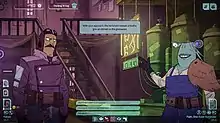Griftlands
Griftlands is a roguelike deck-building game with role-playing story elements in a science fiction setting, developed and published by Klei Entertainment. It is currently available in early access for Windows and is also expected to be released for Nintendo Switch in Q2/Q3 2021.
| Griftlands | |
|---|---|
 Promotional image for Griftlands, Depicting the three playable characters of the game. | |
| Developer(s) | Klei Entertainment |
| Publisher(s) | Klei Entertainment |
| Platform(s) | Microsoft Windows, Nintendo Switch |
| Release | Microsoft Windows TBA |
| Genre(s) | Roguelike, deck-building |
| Mode(s) | Single-player |
Gameplay
Griftlands is a roguelike deck-building game with elements of role-playing and digital card games.[1] The player starts a game by selecting one of the predefined characters, each a mercenary seeking fame and fortune in on a planetary world that is home to an antagonistic peacekeeper body, pirates, and dangerous creatures.[1] While the layout of the world is the same each game, the events, missions, and other elements within it are procedurally generated on starting a new game.[1]
The game is broken up between moving about on an overworld map and engaging in conversation trees to gain quests or shop, and card-based encounters. At the start of the game, the player's character is given two pre-defined decks of cards, one representing those to be used in combat encounters, and another to be used in negotiations. As the player progresses in the game, they can gain new cards for either deck from quest rewards or through shops, upgrade existing cards to more potent versions, or have cards removed from either deck. Additionally, players can earn special implants for their character that have persistent effects throughout the rest of the game.

If an encounter results in combat, then the player takes turn with the computer opponent. Each turn, the player is drawn a hand from their combat deck, and has a number of action points available to use to play cards, which have different action point costs. Combat cards represent a mix of offensive skills to attack the opponent, and defensive skills as to block attacks. The player is informed through the game's interface of what attacks their opponents will do, so they may prepare appropriately. Once the player has used their action points, they discard all remaining cards in their hand, and the opponent's turn is resolved. If the player's character health drops to zero, the game is over. Alternatively, the player can attack to kill their opponents in the same way, but may also try to simply overpower them, allowing the opponent to flee if they take enough damage. This choice may have future impacts on mission availability and rewards.
Negotiations play out similarly to combat, though these are between the player character and a single foe. The goal in negotiations is to wear the opponent's resolve to zero before the player character's. Here, cards represent friendly negotiations which generally do not have ill effects, hostile commentary which may trigger certain actions, and defensive composure cards to prevent losing resolve. Like combat, the player is given information as to what moves the opponent will make. Additionally, special arguments may become active as a result of cards or other abilities. These arguments can damage the opponent's resolve or provide other boosts, among other effects, while they remain active. The player, instead of testing the resolve of the opponent, can try to take out the argument by attacking it directly. If the player's resolve drops to zero, this does not end the game, but changes what may follow: the attempt to swap an opponent may simply fail, or it may cause the player to engage in combat with the character.
Should the player die, the game will restart, but give the player the option of carrying one positive result from the previous run into the new game, such as having made allies with a different character or having an implant available to the new character.
Development
Griftlands is being developed by Klei Entertainment.[2] The game was announced at E3 2017, at that time being an open-world RPG with encounters being played out in turn-based combat similar to most Japanese RPGs.[3] In the interim years, Klei mentioned little of Griftlands while producing Oxygen Not Included. In October 2018, Klei had posted to the game's product page that "we jumped the gun on announcing it because we thought we were further along than we were."[4] The game was re-shown at E3 2019, and while it retained the same setting and art style, the game had transitioned to card-based system, dropping the open world and more traditional role-playing games combat.[4]
Griftlands was released as an early access title in July 2019 for Epic Games Store for a year. The early access version was released on Steam on 15 June 2020 alongside a free demo, and the full version of the game is expected in 6–12 months from the early access release date.[5] A Nintendo Switch version is set to release in Q2/Q3 2021.[6]
References
- Caldwell, Brendan (12 October 2017). "Griftlands is a 'pirate sandbox', says Klei". Rock, Paper, Shotgun. Retrieved 22 December 2017.
- Fenlon, Wes (12 June 2017). "Klei trailer offers the first look at new RPG Griftlands". PC Gamer. Retrieved 22 December 2017.
- Purchese, Robert (12 June 2017). "Klei announces new role-playing game Griftlands". Eurogamer. Retrieved 22 December 2017.
- Fenlon, Wes (June 10, 2019). "Klei's Griftlands is back as a card battle RPG, alpha starts this July". PC Gamer. Retrieved July 12, 2019.
- O'Connor, Alice (June 15, 2020). "Griftlands has sweet-talked its way onto Steam". Rock, Paper, Shotgun. Retrieved June 16, 2020.
- "Griftlands coming to Switch in summer 2021". Gematsu. October 28, 2020. Retrieved October 28, 2020.